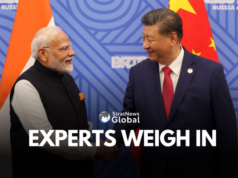Was Iran acting in defiance of its obligations as a member of the Non-Proliferation Treaty? Was it diverting materials or not giving a credible explanation for certain activities that the International Atomic Energy Agency (IAEA) had detected?
Ambassador S Swaminathan, former diplomat who served on the Board of Governors of the IAEA, recalls the growing suspicions in the agency about Iran’s role.
“They wanted an explanation, a credible explanation of material that was found in three different sites … certain uranium particles were detected … I believe this had happened starting from 2000 to 2018.”
When Donald Trump in his first tenure as president, walked out of the Joint Comprehensive Plan of Action (JCPoA) that laid down detailed guidelines under which Iran could continue with its nuclear programme, Iran removed certain cameras monitoring its nuclear facilities.
“So from the IAEA’s point of view, there were difficulties they started facing in being able to confidently say there was no diversion of material,” Swaminathan said.
The air strikes by the U.S. on Iran’s nuclear facilities have deeply worried the IAEA given the possible spread of radiation. The agency was also concerned about 400 kg of 60% enriched uranium which it needed to monitor, because Tehran had threatened to increase the enrichment level to 80%.
Incidentally, there’s nothing in the IAEA rules that make enrichment up to 80% illegal. All they say is these should not be diverted for military purposes.
There is talk of a regional enrichment programme where no enrichment will be done on Iranian soil. Instead this could happen under some kind of a joint arrangement involving Saudi Arabia, the UAE and Qatar along with Iran and the US.
But Iran has insisted on its right to enrich uranium. It’s not clear how this can be overcome, more so at a time when the Iranian regime has been tested and found weak. The clerics are primarily concerned about the survival of the regime, so perhaps some way could be found.
Tune in for more in this conversation with Ambassador Swaminathan, who served on the Board of Governors of the IAEA.
Thirty eight years in journalism, widely travelled, history buff with a preference for Old Monk Rum. Current interest/focus spans China, Technology and Trade. Recent reads: Steven Colls Directorate S and Alexander Frater's Chasing the Monsoon. Netflix/Prime video junkie. Loves animal videos on Facebook. Reluctant tweeter.




